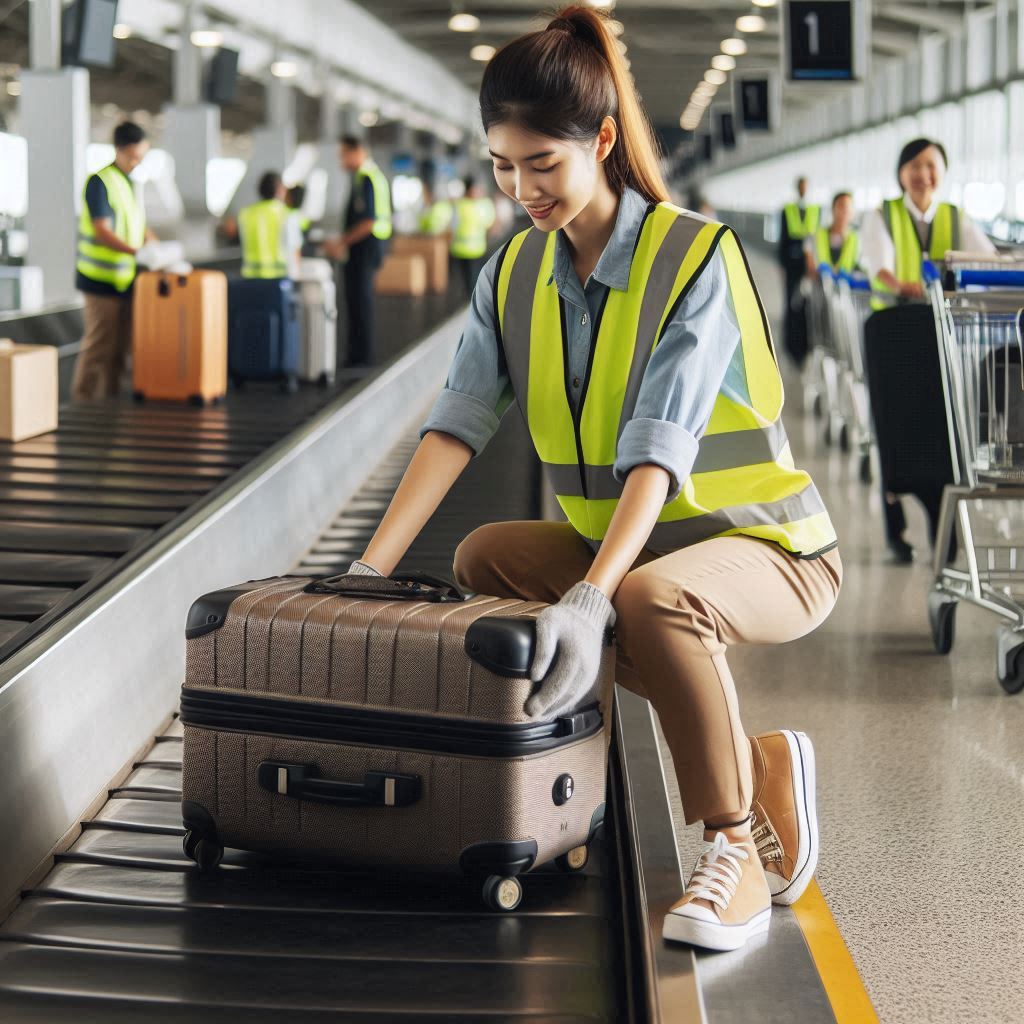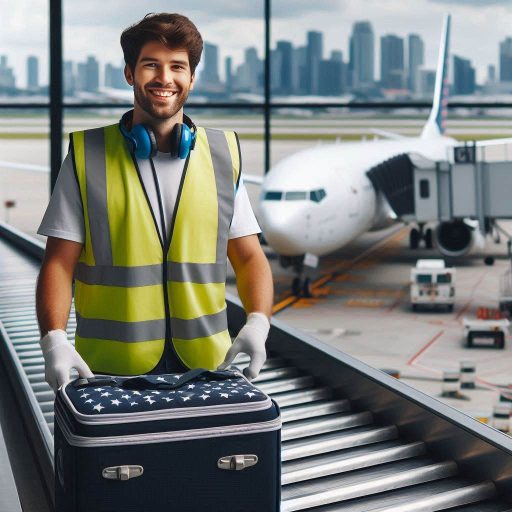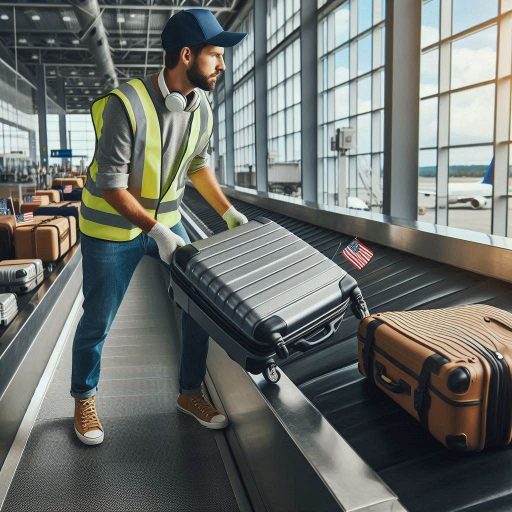Introduction
Customer service skills are essential for baggage handlers in the airline industry.
They frequently interact with passengers, addressing concerns and providing assistance.
Effective communication helps create a positive impression and builds trust with travelers.
Good customer service can significantly enhance the overall travel experience for passengers.
When baggage handlers greet travelers warmly, it sets a friendly tone.
Addressing questions about luggage handling and delivery times reassures anxious passengers.
Handling issues, such as lost or damaged luggage, with empathy is vital.
Baggage handlers who approach problems calmly and professionally can defuse tense situations.
This responsiveness contributes to customer satisfaction and loyalty.
Additionally, maintaining a positive attitude, even in stressful situations, makes a difference.
Passengers appreciate friendly interactions, especially during busy travel times.
Baggage handlers who take the time to listen and assist create a more pleasant airport experience.
Moreover, good customer service can lead to positive word-of-mouth recommendations.
Satisfied travelers are more likely to share their experiences with friends and family.
Customer service skills are crucial for baggage handlers.
They play a significant role in enhancing passengers’ overall travel experiences.
By prioritizing customer service, baggage handlers contribute to the airline’s reputation and success.
Communication skills
The Importance of Clear and Effective Communication with Passengers
Clear and effective communication is crucial for baggage handlers.
Passengers rely on baggage handlers to provide timely and accurate information.
Good communication helps build trust and enhances the overall customer experience.
When baggage handlers communicate well, they can address passenger concerns promptly.
Effective communication also helps reduce misunderstandings during busy travel periods.
Passengers often have many questions about their luggage, and clarity is vital.
Baggage handlers who communicate effectively can reassure passengers, alleviating any anxiety about their belongings.
Moreover, effective communication contributes to a positive airport atmosphere.
Friendly interactions between baggage handlers and passengers create a welcoming environment.
This positive experience encourages repeat business and fosters customer loyalty.
Tips for Communicating Effectively, Both Verbally and Non-Verbally
Baggage handlers can enhance communication skills in several ways.
First, they should practice active listening.
Listening attentively to passengers helps ensure they understand their concerns fully.
Responding appropriately shows passengers that their issues are important.
Second, using clear and concise language is essential.
Baggage handlers should avoid jargon and complicated terms.
Instead, they should speak in simple, easy-to-understand phrases.
This approach helps passengers grasp information quickly and effectively.
Third, maintaining a friendly tone and demeanor is crucial.
A warm, approachable attitude encourages passengers to engage with handlers.
Smiling and making eye contact can create a welcoming atmosphere, enhancing interactions.
Non-verbal communication also plays a significant role.
Baggage handlers should use positive body language to convey openness.
Standing up straight and facing passengers while speaking demonstrates attentiveness and interest.
Avoid crossing arms or looking distracted, as these behaviors can create a negative impression.
Additionally, baggage handlers can utilize visual aids when necessary.
Using maps, signs, or diagrams can help convey information more effectively.
For example, showing passengers where to find their luggage can clarify the process.
Furthermore, handling difficult situations requires special communication techniques.
In cases of delays or lost luggage, baggage handlers should remain calm and composed.
They should provide clear information about what steps are being taken to resolve issues.
Apologizing sincerely can also go a long way in calming upset passengers.
Finally, ongoing training in customer service skills is beneficial.
Regular workshops or role-playing exercises can help baggage handlers practice effective communication.
This training can reinforce skills and improve confidence when interacting with passengers.
Read: Developing Patience and Precision in Pet Grooming
Problem-solving skills
Common Issues That May Arise During Baggage Handling
Baggage handlers often face various challenges while managing luggage.
Lost luggage is one of the most common issues they encounter.
Passengers may panic when their bags do not arrive with them.
Another frequent problem involves damaged items.
Passengers may find their belongings broken or mishandled after travel.
Both situations require immediate attention and resolution.
Additionally, baggage handlers may deal with misplaced luggage tags.
This can lead to confusion about where a bag is located.
Handlers must quickly identify the correct destination to avoid further complications.
Weather conditions can also affect baggage handling.
Rain or snow can delay loading and unloading processes.
In these situations, communication becomes crucial to keep passengers informed.
Furthermore, some passengers may have special requirements for their luggage.
This includes fragile items or oversized bags.
Baggage handlers must ensure that these items are handled with care.
Using Problem-Solving Skills to Address Issues Efficiently and with Empathy
Baggage handlers must possess strong problem-solving skills to tackle these challenges effectively.
When faced with lost luggage, handlers should first assess the situation.
They can use tracking systems to locate the missing bag quickly.
Once the bag is located, it is vital to communicate with the passenger.
Handlers should inform them about the status of their luggage.
This transparency helps alleviate anxiety and builds trust.
For damaged items, baggage handlers should acknowledge the issue promptly.
They can offer a sincere apology to the affected passenger.
This empathetic approach can go a long way in calming upset customers.
Next, handlers should assess the extent of the damage.
They can determine if the airline‘s policy covers repairs or compensation.
Providing clear information about the process reassures passengers that their concerns are being addressed.
In cases of misplaced luggage tags, baggage handlers should act swiftly.
They need to verify the correct destination and communicate it clearly.
Quick resolutions prevent further delays and enhance passenger satisfaction.
Handlers must also stay calm and composed during stressful situations.
This demeanor can help diffuse tension and foster positive interactions with passengers.
Maintaining professionalism reflects well on the airline and the baggage handling team.
Baggage handlers encounter various challenges during their duties.
Lost luggage, damaged items, and misplaced tags are common issues.
Using problem-solving skills efficiently and empathetically is crucial in these situations.
By communicating effectively, acknowledging concerns, and staying calm, baggage handlers can provide excellent customer service.
This commitment to resolving issues enhances the overall passenger experience and strengthens the airline‘s reputation.
Ultimately, strong customer service skills are essential for success in baggage handling roles.
Read: Tips for Nail Technicians Working in High-End Salons
Attention to Detail
Importance of Paying Attention to Details When Handling Passengers’ Luggage
Customer service skills are essential for baggage handlers, especially regarding attention to detail.
Paying close attention ensures that luggage is handled safely and accurately.
Each piece of luggage represents a passenger’s belongings, making careful handling vital.
Handlers must accurately label each bag to avoid confusion.
Proper labeling ensures that luggage arrives at the correct destination.
Attention to detail prevents mix-ups, which can lead to frustrated customers.
Additionally, handlers should inspect bags for any visible damage before loading them.
Identifying issues early allows for appropriate action, such as reporting damaged items.
This proactive approach helps maintain customer trust and satisfaction.
Moreover, baggage handlers must follow protocols when handling fragile items.
Noticing and marking these items appropriately protects them during transit.
Customers appreciate when their valuables receive extra care, enhancing their overall experience.
Furthermore, handlers should be aware of special requests from passengers.
For instance, some travelers may require assistance with oversized luggage.
Paying attention to these requests shows that handlers value customer needs and are willing to assist.
Examples of How Overlooking Small Details Can Lead to Customer Dissatisfaction
Overlooking small details can lead to significant customer dissatisfaction in baggage handling.
For instance, if a baggage handler fails to label a bag correctly, it may end up on the wrong flight.
This mix-up can cause immense stress for passengers who may not receive their luggage on time.
Another example is neglecting to secure luggage properly in the cargo hold.
If bags shift during transport due to improper loading, they may sustain damage.
Passengers often become upset when they receive their belongings in less-than-perfect condition.
Additionally, if handlers overlook fragile labels on luggage, items can break during handling.
When customers discover damaged belongings, their disappointment can lead to complaints.
Such situations can harm the airline’s reputation and negatively affect future business.
Moreover, failing to address luggage claims promptly can create dissatisfaction.
If a passenger reports a lost bag and receives no updates, frustration grows.
Timely communication and attention to detail in managing claims can improve customer experiences significantly.
In another instance, failing to recognize special handling requests can also disappoint customers.
For example, if a passenger indicates that a bag contains important medical supplies, handlers must treat it with care.
Ignoring these requests can lead to serious consequences and customer dissatisfaction.
In review, customer service skills are vital for baggage handlers, particularly attention to detail.
Properly labeling and inspecting luggage ensures a smooth handling process.
Failing to notice small details can result in significant issues, such as lost or damaged bags.
By paying attention to details, baggage handlers can enhance customer satisfaction.
Ultimately, their commitment to excellence plays a crucial role in the overall travel experience.
Ensuring that passengers‘ luggage is handled with care and consideration fosters loyalty and trust in the airline.
Read: Understanding Pet Grooming Safety Standards

Time management
The Significance of Being Efficient and Punctual in Baggage Handling
Efficiency and punctuality are crucial for baggage handlers in the airport environment.
Passengers rely on timely delivery of their luggage, impacting their travel experience.
When baggage handlers perform their tasks efficiently, they help ensure that flights depart on time.
Being punctual in baggage handling prevents delays in the boarding process.
Late luggage can lead to frustrated passengers and increased workload for staff.
Handlers who consistently meet deadlines contribute to overall airport efficiency and customer satisfaction.
Moreover, efficient baggage handling minimizes the risk of lost or damaged luggage.
When handlers quickly and accurately manage bags, they reduce the chances of mistakes.
This accuracy builds trust with passengers and reflects positively on the airline’s reputation.
Ultimately, the success of baggage handling operations hinges on efficiency and punctuality.
Handlers must prioritize these skills to maintain smooth airport operations and enhance customer service.
Time Management Strategies for Baggage Handlers
Baggage handlers can implement various time management strategies to ensure timely delivery of luggage.
First, they should prioritize their tasks based on flight schedules.
Understanding which flights are boarding or arriving helps handlers focus on urgent tasks.
Using checklists can also enhance efficiency.
Handlers can create a list of daily responsibilities to keep track of essential tasks.
By checking off completed items, they can stay organized and avoid overlooking important duties.
Communication plays a vital role in time management.
Handlers should maintain clear communication with their team members and supervisors.
Reporting any delays or issues immediately helps everyone adjust their priorities and minimizes disruptions.
Another effective strategy is to establish a routine.
Handlers should develop consistent workflows for common tasks, such as loading and unloading luggage.
By following a routine, they can streamline their processes and reduce time spent on repetitive activities.
Staying aware of the surrounding environment is essential as well.
Handlers should monitor weather conditions and potential obstacles that may affect their work.
By anticipating challenges, they can adjust their plans accordingly and maintain efficiency.
Finally, prioritizing breaks and self-care is essential for maintaining energy and focus.
Handlers should ensure they take regular breaks to recharge.
Staying hydrated and nourished throughout shifts helps them maintain high performance levels.
Customer service skills, including efficiency and punctuality, are vital for baggage handlers.
Timely delivery of luggage enhances the travel experience and boosts airline reputation.
By implementing effective time management strategies, baggage handlers can optimize their performance and contribute positively to customer service.
Prioritizing these skills ultimately leads to a smoother airport operation and satisfied passengers.
Read: Understanding Nail Disorders: A Technician‘s Guide
Teamwork
The Collaborative Nature of Baggage Handling
Baggage handling is a highly collaborative process that relies on teamwork.
Baggage handlers work closely with ground staff, pilots, and other team members.
Effective communication and coordination are vital for seamless operations at the airport.
Handlers must be aware of each other‘s roles to work efficiently.
They need to understand how their actions impact the entire team.
For example, a delay in loading bags can affect flight schedules.
Recognizing this interconnectedness fosters a sense of responsibility among colleagues.
Teamwork enhances customer service by ensuring that passengers’ luggage is handled promptly.
When baggage handlers communicate well, they can resolve issues quickly.
This efficiency leads to fewer delays and a smoother travel experience for customers.
A positive work environment promotes better teamwork.
When colleagues support each other, they can tackle challenges together.
This camaraderie helps maintain morale, which ultimately improves customer interactions.
Tips for Enhancing Teamwork Skills to Improve Customer Service
Baggage handlers can enhance their teamwork skills through various strategies.
First, they should prioritize clear communication with colleagues.
Using concise language and active listening can reduce misunderstandings during busy shifts.
Regular team meetings can also strengthen relationships among baggage handlers.
These meetings provide an opportunity to discuss challenges and share solutions.
By addressing issues together, teams can develop a more cohesive approach to baggage handling.
Baggage handlers should practice empathy towards their teammates.
Understanding each other‘s perspectives fosters a supportive environment.
When team members feel valued, they are more likely to collaborate effectively.
Cross-training can enhance teamwork skills as well.
When handlers learn about each other‘s roles, they gain valuable insights.
This knowledge enables them to step in and assist when needed, improving overall efficiency.
Handlers should also set shared goals to boost teamwork.
By working towards common objectives, they create a sense of unity.
This focus encourages collaboration and reinforces the importance of each team member‘s contribution.
Positive reinforcement plays a significant role in teamwork.
Acknowledging colleagues‘ efforts and achievements fosters a supportive atmosphere.
Recognizing hard work motivates team members to continue performing at their best.
The collaborative nature of baggage handling is vital for excellent customer service.
Baggage handlers must work well with colleagues to ensure smooth operations.
By enhancing teamwork skills, they can improve communication, foster empathy, and create a supportive work environment.
Implementing these strategies will not only benefit baggage handlers but also lead to a better experience for passengers.
With effective teamwork, they can navigate challenges together and provide exceptional service.
Conflict Resolution
Addressing Potential Conflicts Between Baggage Handlers and Passengers
Conflicts can arise between baggage handlers and passengers due to various reasons.
Passengers may feel frustrated about delayed luggage or damaged bags.
These situations can lead to heightened emotions and confrontations.
Baggage handlers often find themselves on the front lines, addressing passenger concerns directly.
Handlers must remain calm and professional when facing agitated customers.
Understanding passenger frustrations is crucial for de-escalating tense situations.
Empathy plays a significant role in resolving conflicts effectively.
When baggage handlers acknowledge a passenger’s feelings, it can help defuse anger.
Additionally, miscommunication can lead to conflicts.
Passengers may misunderstand baggage policies or wait times.
Clear communication can help manage expectations and reduce misunderstandings.
Baggage handlers should provide concise information about processes and timelines.
This clarity helps build trust and improves customer satisfaction.
Handlers should also be prepared for unexpected situations.
For example, weather-related delays can disrupt baggage handling operations.
Passengers may become anxious or angry in these scenarios.
Baggage handlers must approach these situations with patience and understanding.
Techniques for Resolving Conflicts Peacefully and Professionally
Several techniques can help baggage handlers resolve conflicts peacefully and professionally.
Active listening is essential in any customer service interaction.
By giving passengers their full attention, handlers can understand their concerns better.
This practice shows passengers that their feelings are valid and appreciated.
Next, baggage handlers should remain calm and composed during conflicts.
Maintaining a steady tone of voice can help de-escalate tensions.
A calm demeanor reassures passengers and demonstrates professionalism.
Even in heated situations, handlers must avoid responding with frustration or defensiveness.
Offering solutions is another effective technique for conflict resolution.
Once handlers understand the issue, they can propose practical solutions.
For instance, if luggage is delayed, handlers can explain the timeline for its arrival.
Providing options helps passengers feel more in control of the situation.
Handlers should also express empathy throughout the interaction.
Phrases like ‘I understand how frustrating this is‘ can help build rapport.
Validating a passenger‘s feelings can significantly reduce anger and promote cooperation.
Empathy creates a more positive atmosphere for resolving conflicts.
Additionally, knowing when to involve a supervisor is vital.
If a situation escalates beyond a handler‘s control, they should seek assistance.
A supervisor can provide additional support and help address passenger concerns effectively.
This action shows passengers that their issues are taken seriously.
Customer service skills are essential for baggage handlers.
Conflicts can arise between handlers and passengers, often due to misunderstandings or frustrations.
By using techniques like active listening, maintaining calmness, and offering solutions, baggage handlers can resolve conflicts professionally.
Empathy plays a crucial role in building positive relationships with passengers.
Additionally, knowing when to involve a supervisor can further enhance conflict resolution efforts.
By prioritizing customer service, baggage handlers contribute to a more pleasant travel experience for everyone involved.
Gain More Insights: How to Excel as an Office Clerk in Service Roles
Empathy
Importance of Showing Empathy Toward Passengers
Showing empathy towards passengers is crucial for baggage handlers.
The travel experience can be stressful for many travelers.
When bags are lost or delayed, emotions can run high.
Baggage handlers who respond with empathy can help ease passenger concerns.
Empathy builds trust between passengers and airline staff.
When handlers acknowledge passengers’ feelings, it creates a supportive environment.
Passengers feel heard and understood, which enhances their overall experience.
A simple empathetic response can transform a negative situation into a more positive interaction.
Furthermore, demonstrating empathy fosters better communication.
When handlers empathize, they can better understand passengers‘ needs and concerns.
This understanding leads to more effective problem-solving.
Addressing issues with compassion can defuse tense situations and encourage cooperation.
Examples of Demonstrating Empathy
There are several effective ways baggage handlers can demonstrate empathy.
For instance, when a passenger expresses concern about lost luggage, handlers should listen attentively.
Instead of dismissing their worries, handlers can say, ‘I understand how frustrating this is for you‘.
This simple acknowledgment validates the passenger’s feelings.
Handlers can also offer reassurance by explaining the steps they will take.
They might say, ‘We are actively searching for your bag, and we will keep you updated‘.
Providing clear information helps alleviate anxiety and shows the passenger that their concerns matter.
Another way to demonstrate empathy is through body language.
Maintaining eye contact and using open gestures can make a big difference.
These nonverbal cues show that handlers are genuinely engaged in the conversation.
Passengers often appreciate when staff members convey warmth and understanding through their actions.
Offering assistance beyond standard procedures is another empathetic approach.
If a passenger appears distressed, handlers can inquire if they need additional support.
They might say, ‘Is there anything else I can do to help you today?‘ This extra step shows a willingness to go above and beyond.
Additionally, handlers can share personal experiences to create a connection.
For example, they might say, ‘I understand how it feels to have a delayed flight; it can be really frustrating.
‘ This shared experience helps passengers feel less isolated in their feelings.
Moreover, timely follow-ups can enhance the empathetic experience.
If a passenger’s bag is located later, handlers should reach out with updates.
Informing passengers about progress shows that their concerns remain a priority.
Demonstrating empathy not only enhances the overall customer experience but also reflects positively on the airline.
Happy passengers are more likely to return and recommend the airline to others.
A strong commitment to customer service sets an airline apart in a competitive industry.
Transform Your Career Today
Unlock a personalized career strategy that drives real results. Get tailored advice and a roadmap designed just for you.
Start NowConclusion
Customer service skills are essential for baggage handlers in the airline industry.
Handlers often interact with passengers, addressing concerns and providing assistance.
Key customer service skills include effective communication, problem-solving, and empathy.
These abilities help handlers respond to passenger needs promptly and professionally.
Baggage handlers play a vital role in ensuring a positive travel experience.
When they handle luggage efficiently and courteously, passengers feel valued.
Their interactions can significantly impact overall passenger satisfaction.
A friendly demeanor and willingness to assist can turn a stressful situation into a positive experience.
Additionally, strong customer service skills enhance teamwork among staff.
Baggage handlers often collaborate with airline employees, security personnel, and ground crews.
Effective communication fosters a supportive work environment, ultimately benefiting passengers.
Moreover, the ability to handle complaints gracefully is crucial.
When issues arise, such as lost or damaged luggage, baggage handlers must remain calm and solutions-focused.
Their approach can influence how passengers perceive the airline.
Customer service skills are critical for baggage handlers.
These skills directly affect passenger satisfaction and the overall reputation of the airline.
By prioritizing customer service, baggage handlers contribute to a positive travel experience, reinforcing the importance of their roles in the industry.
[E-Books for Sale]
The Big Book of 500 High-Paying Jobs in America: Unlock Your Earning Potential
$19.99 • 500 High-Paying Jobs • 330 pages
Explore 500 high-paying jobs in America and learn how to boost your career, earn more, and achieve success!
See All 500 High-Paying Jobs of this E-Book
1001 Professions Without a Degree: High-Paying American Jobs You Can Start Now
$19.99 • 1001 Professions Without a Degree • 174 pages
Discover 1001 high-paying jobs without a degree! Unlock career tips, skills, and success strategies for just $19.99!




